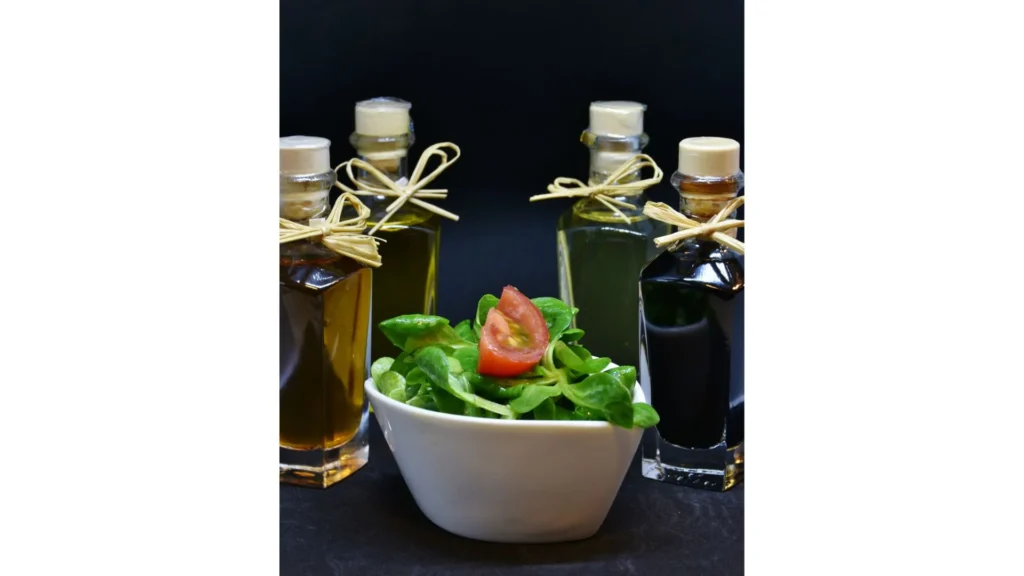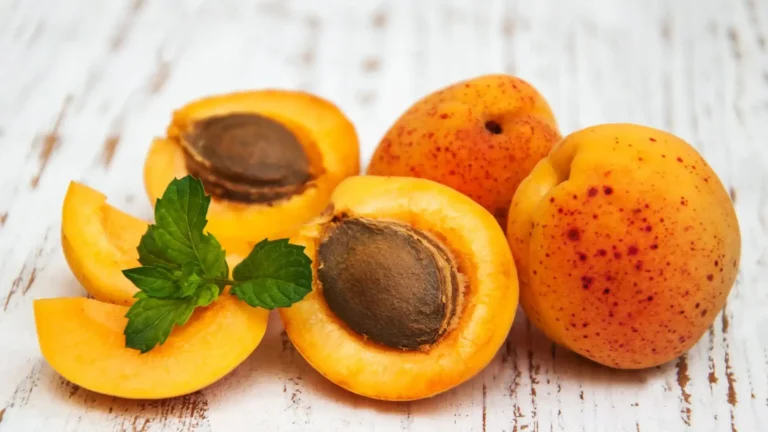The renowned elixir, apple cider vinegar (ACV) is a staple in many kitchens and wellness regimens. Revered for its versatility in recipes and natural remedies, apple cider vinegar’s (ACV) tangy essence enhances a myriad of dishes and health concoctions.
However, not everyone has ACV readily available, and some may seek alternative flavors or benefits. Thus, we aim to explore suitable substitutes that maintain the integrity of your culinary creations and health routines, ensuring you never miss a beat even without the classic ACV.

Top Substitutes for Apple Cider Vinegar
Top substitutes for apple cider vinegar cater to various culinary and health needs, ensuring versatility in its absence. White wine vinegar stands as a prime alternative, offering a similar acidity and fruitiness, perfect for dressings and marinades. Further, lemon or lime juice, rich in vitamin C, introduces a fresh, citrusy zing to dishes, acting as an excellent swap in recipes requiring a tangy flavor. For those seeking a sweeter profile, balsamic vinegar can add depth and a hint of sweetness, ideal for glazes and reductions.
Rice vinegar, with its mild and slightly sweet flavor, suits Asian recipes beautifully, preserving the intended taste balance without overpowering the dish. Lastly, malt vinegar, known for its robust flavor, serves well in pickling and as a finishing touch on fries, offering a distinct taste alternative.
Each substitute provides unique benefits, enabling seamless adaptation in recipes and preserving the intended culinary experience. Whether for health considerations, taste preferences, or simply due to availability, these alternatives ensure that your cooking and wellness routines remain uninterrupted.
White Vinegar
White vinegar emerges as a straightforward yet effective substitute for apple cider vinegar (ACV) in numerous culinary contexts. Characterized by its clear color and sharp, acidic taste, white vinegar excels in pickling, marinades, and also as a cleaning agent due to its potent antimicrobial properties. Its neutral flavor makes it a versatile ingredient, capable of blending into any dish without altering the original taste profile.
Compared to ACV, white vinegar boasts a higher acidity level, typically around 5% to 7%, making it slightly more potent in recipes requiring a sharp, clean acid note. While ACV is celebrated for its potential health benefits, including aiding digestion and stabilizing blood sugar levels, white vinegar’s benefits are more aligned with its preservative qualities and its use as a natural household cleaner.
Despite lacking the fruity undertones of ACV, white vinegar stands as a culinary staple, offering a cost-effective and widely available option as an acidic component in cooking. Its simplicity and effectiveness ensure that it remains a go-to alternative, especially in recipes where the distinct apple flavor of ACV is not critical.
Lemon Juice
Lemon juice serves as a vibrant substitute for ACV in many recipes. Its natural acidity and tanginess closely mimic the sharp, fruity essence of ACV, making it an ideal choice for dressings, marinades, and beverages. By adjusting the amount used, lemon juice can provide a comparable level of sourness, while also infusing dishes with a fresh, citrusy undertone.
In terms of health benefits, lemon juice parallels ACV by offering a rich source of vitamin C, a powerful antioxidant that supports immune function and skin health. Additionally, like ACV, lemon juice has been touted for its potential to aid digestion and promote hydration. Its alkalizing effect upon digestion, despite its initial acidity, aligns with ACV’s reputed benefits for maintaining a balanced internal pH level.
Incorporating lemon juice into your diet not only brings a zestful flavor to your meals but also contributes to your overall well-being, echoing the healthful properties of apple cider vinegar. Its accessibility and versatility in the kitchen ensure that lemon juice is not just an alternative but a staple in its own right.
Lime Juice
Lime juice, much like its citrus counterpart, lemon juice, acts as a tangy and vibrant substitute for apple cider vinegar. Bearing a similar acidity profile, lime juice can effortlessly mimic the zesty tang of ACV in a variety of dishes. It stands out in recipes where its distinct tropical aroma can either complement or enhance the flavors, such as in Mexican, Thai, and other Southeast Asian cuisines.
Opting for lime juice over lemon depends largely on the flavor profile you’re aiming for. While both can interchangeably serve the purpose of providing acidity, lime juice brings a slightly more floral and intense citrus note. Therefore, it’s the substitute of choice for dishes that benefit from its bold, yet refreshing taste.
Lime juice shares lemon juice’s health benefits, being rich in vitamin C and antioxidants, and offers a similar aid in digestion and hydration. Its use in cooking not only elevates the taste of food but also contributes to a nutritious diet. In essence, lime juice is an excellent alternative to ACV, especially in recipes where its unique flavor can shine through, offering a delightful twist to traditional preparations.
Rice Vinegar
Rice vinegar emerges as a milder vinegar option, ideal for dishes where a gentle acidity is preferred. Its subtly sweet and less pungent profile enhances the flavors of a dish without dominating them. This characteristic makes it especially suited for dressing salads, seasoning sushi rice, and crafting delicate sauces where the inherent taste of the primary ingredients should shine through.
The cultural significance of rice vinegar in Asian cuisines is profound. It holds a pivotal role in the culinary traditions of countries like Japan, China, and Korea, where it is not just a condiment but a foundational element that imparts depth and authenticity to a myriad of dishes. From the sweet and tangy balance it brings to pickled vegetables to its crucial part in the preparation of sushi rice, rice vinegar is a testament to the nuanced palate of Asian cuisine.
Opting for rice vinegar as a substitute for apple cider vinegar means choosing an ingredient that respects the balance and harmony of flavors. Its application in cooking goes beyond mere acidity; it is a bridge to exploring the rich, subtle tastes and traditions of Asian culinary arts.
Balsamic Vinegar
Balsamic vinegar brings a rich flavor profile to the table, distinguished by its complex sweetness and acidity. This depth makes it an appropriate substitute for ACV when a recipe can benefit from its nuanced character. It shines in reductions, glazes, and salad dressings, where its syrupy consistency and sweetness can add a luxurious touch to simple dishes.
In comparison to ACV, balsamic vinegar also offers health benefits, albeit with a focus on different nutritional aspects. While ACV is praised for its potential to aid in digestion and blood sugar regulation, balsamic vinegar has its own health benefits, The latter’s antioxidant content, derived from the grapes used in its production, supports heart health and reduces inflammation. Its moderate use can contribute to a balanced diet, adding flavor, elegant depth, and nutritional value.
White Wine Vinegar
White wine vinegar serves as an effective substitute for apple cider vinegar, bringing its own unique set of flavors to the culinary table. Its use cases in cooking are broad, excelling in vinaigrettes, marinades, sauces, and as a way to brighten the flavors of soups and stews. Compared to ACV, white wine vinegar offers a similar acidity but with a lighter, more refined taste that can enhance dishes without introducing the distinct apple flavor.
In recipes where the fruitiness of ACV might overpower delicate ingredients, white wine vinegar steps in as a more balanced alternative, providing the necessary acidity without competing with other flavors. Its ability to blend seamlessly into a variety of dishes makes it a versatile ingredient in kitchens that favor subtle yet impactful seasoning.
Red Wine Vinegar
Red wine vinegar stands as a robust substitute for apple cider vinegar (ACV), especially in dishes that can benefit from its full-bodied flavor. It is best used in recipes where its bold taste can complement the ingredients, such as in marinades, salad dressings, and sauces for red meats. The deep, tangy notes of red wine vinegar make it an ideal match for heartier dishes, enhancing flavors without overpowering them.
In terms of health benefits, red wine vinegar shares some of the positive attributes of ACV, including the presence of antioxidants that help fight free radicals and promote heart health. Additionally, its acetic acid content may aid in digestion and improve insulin sensitivity, contributing to a balanced diet and wellness routine.
Choosing red wine vinegar as an alternative to ACV allows for the exploration of richer flavor profiles in cooking, while also incorporating a vinegar that offers a suite of health benefits.

Malt Vinegar
Malt vinegar emerges as a distinctive substitute for ACV, particularly shining in recipes rooted in British cuisine. Its best applications include dressing classic fish and chips, pickling, and adding depth to sauces and marinades. The robust, slightly sweet flavor derived from malted barley gives it a unique profile that complements the hearty fare of British dishes, making it an ideal choice for those looking to infuse their cooking with traditional flavors.
The flavor profile of malt vinegar is complex, with a pronounced tanginess coupled with the nutty, caramel notes from the barley. This complexity adds a rich layer to dishes that might be overpowered by the sharper acidity of ACV. Health-wise, while malt vinegar may not boast as wide a range of benefits as ACV, it still offers some digestive perks due to its acetic acid content. However, those with gluten sensitivities should proceed with caution, as it is derived from barley.
Opting for malt vinegar as an ACV substitute invites a taste of British culinary tradition into your kitchen, along with a distinct flavor profile that can elevate specific dishes beyond their ordinary renditions. Its unique taste and potential health considerations make it a noteworthy alternative for those looking to diversify their vinegar usage in cooking.
Tamarind Paste
Tamarind paste emerges as a unique substitute for apple cider vinegar, offering a distinct flavor profile along with notable health benefits. Derived from the pulp of tamarind fruit, this paste imparts a sweet and sour taste that can mimic the tangy acidity of ACV, especially in Southeast Asian and Indian cuisines. It’s particularly effective in dishes requiring a hint of fruity sourness, such as curries, marinades, and chutneys.
To incorporate tamarind paste in recipes as an ACV substitute, start with a small amount and adjust according to taste, as its intensity can vary. It blends well in liquids, making it easy to integrate into sauces and soups. Diluting the paste with water can also create a more vinegar-like consistency, allowing for a closer match to ACV’s texture in recipes.
The health benefits of tamarind paste include its high antioxidant content, which can aid in reducing inflammation and promoting heart health. It also contains magnesium, potassium, and a bit of vitamin C, offering nutritional value alongside its culinary uses. This makes tamarind paste an intriguing option for those looking to explore traditional but versatile vinegar substitutes.
DIY Apple Cider Vinegar Substitute
Creating a DIY apple cider vinegar (ACV) substitute is straightforward and can be a lifesaver for those moments when you’re out of ACV but need it for a recipe. A quick recipe involves mixing 1 tablespoon of lemon juice or white vinegar with ¼ teaspoon of sugar to replicate the fruity acidity and slight sweetness of ACV. This mixture yields about 1 tablespoon of substitute, perfect for dressings, marinades, and any recipe calling for ACV.
For those seeking a closer flavor match, especially in recipes where the distinctive apple taste is crucial, mixing 1 part apple juice with 1 part white vinegar offers a more nuanced substitute. Adjust the sugar according to the sweetness of the apple juice and the acidity of the vinegar to achieve the desired balance.
This homemade ACV substitute provides an effective solution, allowing you to continue cooking your favorite dishes without interruption, using ingredients you likely already have in your kitchen.
Reasons for Needing Apple Cider Vinegar Substitute
Reasons for needing an apple cider vinegar (ACV) substitute vary widely, ranging from practical to personal preferences. Availability issues are a common reason; you might find yourself in the midst of cooking only to realize ACV is missing from your pantry. This immediate need often prompts the search for a quick and accessible alternative.
Health concerns also play a significant role. Some individuals may have dietary restrictions or allergies that make ACV unsuitable, such as sensitivity to yeast or fermented products. In these cases, finding a non-fermented substitute becomes essential to maintain dietary well-being.
Taste preferences cannot be overlooked. ACV has a distinct, robust flavor that might not appeal to everyone or might overpower delicate dishes. Those seeking a milder or different flavor profile might opt for substitutes like lemon juice or rice vinegar, which can provide the desired acidity without compromising the taste of the food.
Lastly, cost considerations may influence the choice of a substitute. ACV can be pricier, especially organic or raw versions with ‘the mother’ of ACV. More affordable alternatives, such as white vinegar or homemade mixtures, offer practical solutions for those managing kitchen budgets closely.
Understanding these varied reasons helps in selecting the most suitable ACV substitute, ensuring cooking and dietary needs are met without compromise.
How to Choose the Right Substitute
Choosing the right substitute for apple cider vinegar (ACV) involves considering several factors based on the recipe requirements. The flavor is paramount; select a substitute that complements or closely matches the intended taste profile of the dish. For instance, lemon juice is ideal for adding a fresh, citrusy zing, while balsamic vinegar suits dishes needing a sweet, complex depth.
Acidity is another critical factor. The substitute should mirror ACV’s acidity level to maintain the recipe’s balance. White wine vinegar and lemon juice, with their similar acidic properties, are often suitable replacements. However, the exact sourness can vary, so adjustments may be needed.
Health benefits might also influence your choice, especially if you’re using ACV for its digestive or antimicrobial properties. In such cases, look for substitutes that offer similar benefits, like lemon or lime juice for their vitamin C content.
When adjusting quantities, start with a one-to-one ratio, then tweak based on taste and acidity. For substitutes with stronger flavors or higher acidity, like balsamic vinegar, you might need to use less than the recipe calls for ACV. Conversely, for milder substitutes, a slight increase may be necessary to achieve the desired effect.
Choosing the right ACV substitute is a blend of understanding the recipe’s needs and experimenting to find the perfect balance, ensuring the final dish remains delicious and flavorful.
Additional Tips and Tricks
Additional tips and tricks can enhance your cooking experience when using apple cider vinegar (ACV) substitutes. Adjusting your cooking techniques may be necessary to achieve the best results with these alternatives. For instance, when using lemon or lime juice, adding them towards the end of the cooking process can help preserve their fresh, vibrant flavor. For substitutes like balsamic vinegar, reducing them can concentrate the flavor, making them more similar to the rich taste profile of ACV in recipes.
Storing substitutes for longevity is crucial to ensure they remain effective and flavorful. Vinegar-based substitutes, such as white wine vinegar or balsamic vinegar, should be stored in a cool, dark place to maintain their quality. Citrus-based substitutes like lemon or lime juice, on the other hand, are best stored in the refrigerator and can be frozen in ice cube trays for extended shelf life. Ensuring proper storage conditions will keep these substitutes ready at hand for when you need them, without compromising their taste or health benefits.
These additional considerations, from adjusting cooking techniques to proper storage, will help you seamlessly incorporate ACV substitutes into your culinary repertoire, ensuring delicious outcomes every time.
Discovering the Perfect Match: Exploring Apple Cider Vinegar Alternatives
Finding the best substitute for apple cider vinegar depends on the specific needs of your recipe and personal taste preferences. White wine vinegar and lemon juice stand out for their versatility and ability to mimic ACV’s acidity in most dishes. Balsamic vinegar offers a sweeter, more complex flavor for reductions and glazes, while rice vinegar is ideal for adding a mild, sweet acidity to Asian recipes. Malt vinegar and tamarind paste bring unique flavors suited to specific culinary traditions, enriching dishes with their distinct profiles.
We encourage you to experiment with these substitutes to discover what works best for your culinary creations. Each alternative brings its own set of flavors, health benefits, and uses, offering a wide palette for your cooking adventures. Whether you’re adjusting for taste, health, or availability, there’s a substitute that can meet your needs while keeping your dishes delicious and balanced.
FAQs on Top Apple Cider Vinegar Substitutes
Can I use white vinegar instead of apple cider vinegar in recipes?
Yes, white vinegar can be used as a substitute for ACV, especially in recipes where the distinct apple flavor of ACV is not crucial. It offers a similar level of acidity but with a cleaner, more neutral taste. Start with a one-to-one ratio, adjusting to your taste preference.
What's the best ACV substitute for salad dressings?
Lemon or lime juice serves as the best substitute for ACV in salad dressings, providing a fresh, citrusy tang. They not only mimic the acidity needed for the dressing but also add a vibrant flavor that complements green salads exceptionally well.
Is there a non-acidic substitute for apple cider vinegar?
For those sensitive to acidity but seeking a similar tangy effect, tamarind paste is an excellent non-acidic substitute. Its sweet and sour profile can closely mimic the flavor of ACV in sauces and marinades. Dilute with water to adjust consistency and sweetness according to your recipe needs.








